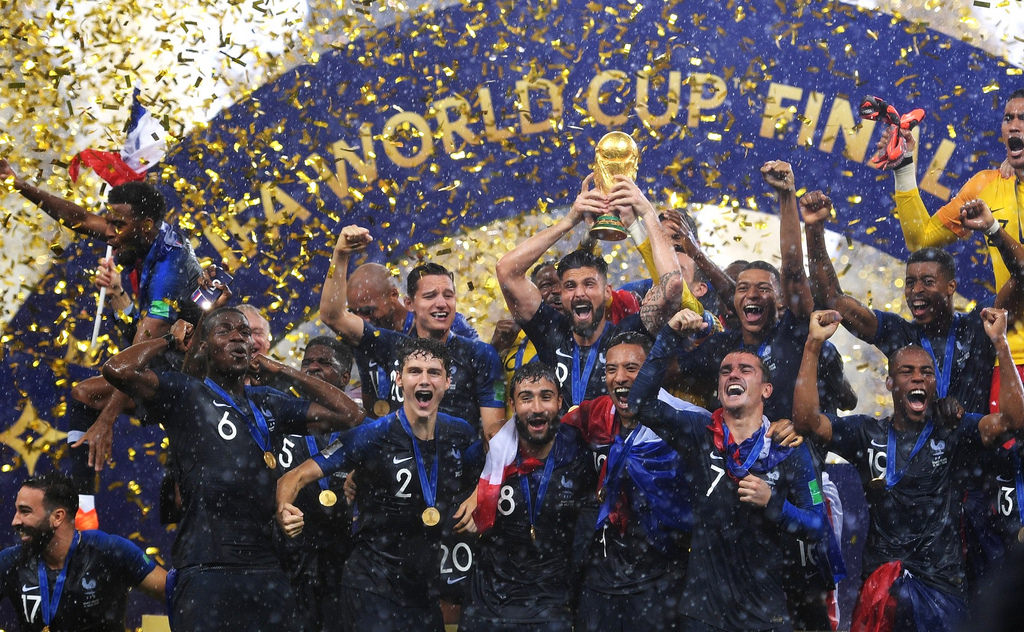Prior to the start of the quadrennial tournament this summer, football fans across the world grew sceptical over Russia’s credentials and ability to host the most prestigious tournament in world football. With half built stadiums, mentions of Russia’s recent doping history and the vast distance that players would travel for matches, many wondered how they were going to live up to the standard of previous World Cups.
Despite all this, what emerged was a World Cup like no other. The 2018 tournament marked the start of a new era in football; with VAR making its debut, England showing some form of tactical nouse, and the curtain closing on Messi and Ronaldo’s chances on lifting the elusive golden trophy, which allowed some of the emerging talents, like Mbappe, Neymar and Trippier, step into the spotlight.
France entered the tournament on the back of a disappointing loss in the Euro 2016 Final, losing in Paris after extra time to a Ronaldo-less Portugal. Having learnt from that loss, Deschamps brought with him the youngest squad out of all the countries at this year’s World Cup, moving on from the likes of Patrice Evra and Bacary Sagna who both somehow started the 2016 Final.
Instead, Deschamps had with him Lucas Hernandez, Benjamin Pavard and of course the Young Player of the Tournament, Kylian Mbappe.
The 19-year-old set the tournament alight with his scintillating speed shown when he picked the ball up in his own half, left Mascherano and Rojo back in Buenos Aires, before the latter brought him down for a penalty. Antoine Griezmann showed his class as he sent the keeper the wrong way, and then the 27-year-old man proceeded to celebrate with a dance from Fortnite. Mbappe went on to score two more goals sealing the win for Les Blues, and set France on their way to World Cup glory again for the first time since 1998.
Deschamps, however, knew that starting Mbappe and Griezmann together wouldn’t work as a front two, so he called upon Olivier Giroud to complete his attacking trio. Whilst the 6’4” striker managed to muster a grand total of 0 shots on target throughout the entire tournament, he played a vital role in connecting the attacking moves and was excellent at holding the ball up and bringing teammates into play.
Les Blues returned to Paris having redeemed themselves from their previous failure two years prior, something England aimed to achieve following their premature exit in 2016.
With the Icelandic “Viking Thunder-Clap” still ringing in the ears of the England players, they set off for Russia knowing that they could not have a repeat of that embarrassing exit.
Following that defeat, In came new manager Gareth Southgate who brought with him a breath of fresh air as he, like Deschamps, brought a very young squad. replacing deadwood like Rooney and Hart and bringing in Ruben Loftus-Cheek, Trent Alexander-Arnold and Jesse Lingard.
Unlike previous England managers, Southgate actually seemed like he had a plan and knew what he wanted to do, employing a 3-5-2 formation having converted Kyle Walker to a centre-back, allowing Trippier to play at right wing-back where he flourished throughout the tournament.
The aforementioned Walker, his Manchester City teammate John Stones and Harry “Slabhead” Maguire, formed a formidable backline, and showed how English defenders can play out from the back. That was before Stones, who was too busy figuring out how he has more World Cup goals than England legend Wayne Rooney, was left in the dust by the villain of the hour, Mario Mandžukić who rifled his left-footed strike past a helpless Jordan Pickford and sadly sent England home before they could face France (who would’ve also sent us home).
Whilst England exceeded all the expectations prior to the tournament starting, the thoughts remain of “what could’ve been”.
If only Harry Kane had put away that chance in the first half. If only Pickford had got a strong left hand to Mandžukić’s shot. If only Gareth Southgate had actually used Delph or Loftus-Cheek instead of leaving us with Jesse Lingard ambling about the pitch for 120 minutes, for the second time in the tournament.
More than anything this World Cup was a steep learning curve for the young Three Lions, and Gareth Southgate, as for many this won’t be their last chance at winning it. Whilst we may never have a better opportunity, with some of the major nations failing to clear the first hurdle, there’s no reason why this England squad can’t progress and challenge for a title in the next ten years.
Until we do win something, the country will have to make do of re-watching that Harry Kane header against Tunisia, Pickford’s penalty save, or The Bury Beckham’s fifth minute free-kick that sent the country into pandemonium.
James Cohen
Sports Print Editor
Featured image credit: Flickr

